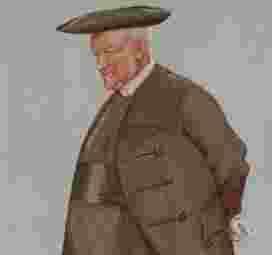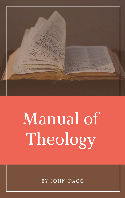
Alexander Epistles of John Commentary
Alexander Epistles of John Commentary is an Anglican commentary on the three epistles of the Apostle John.
The Epistles of John Alexander Epistles of John Commentary
1John Commentary
William Alexander
My first impression of this book is that it probably has great and tremendous information, but it is from “yester-year” and is form is difficult to get the jewels out of it. But this is a 25 chapter commentary on John’s Epistles, even though his treatment is not straight in the order of verses commented on.

Dagg Manual of Theology (and links to this work in various other formats).
Dagg Manual of Theology (MySword for Android)
Dagg Manual of Theology (theWord Bible Format)
Dagg Manual of Theology (esword format)
Dagg Manual of Theology (PDF Format)
William Alexander (13 April 1824 – 12 September 1911) was an Irish cleric in the Church of Ireland. (I believe this is the correct “William Alexander”)
First Epistle of John – 1John Commentary
Part 1
Chapter 1 – The Surroundings of the First Epistle of St. John
Chapter 2 – The Connection of the Epistle with the Gospel of St. John
Chapter 3 – The Polemical Element in the First Epistle of St. John
Chapter 4 – The Image of St. John’s Soul in His Epistle
Part 2 of Alexander Epistles of John Commentary
Some General Rules for the Interpretation of the First Epistle of St. John
Chapter 5 – Analysis and Theory of St. John’s Gospel
Chapter 6 – St. John’s Gospel Historical, not Ideological
Chapter 7 – Extent of the Atonement
Chapter 8 – Missionary Application Of the Extent of the Atonement
Chapter 9 – The Influence of the Great Life Walk a Personal Influence
Chapter 10 – The World which We Must Not Love
Chapter 11 – Use and Abuse of the Sense of the Vanity of the World
Chapter 12 – Knowing All Things
Chapter 13 – Lofty Ideals Perilous unless Applied
Chapter 14 – Boldness in the Day of Judgment
Chapter 15 – Birth and Victory
Chapter 16 – The Gospel as a Gospel of Witness; the Three Witnesses
Chapter 17 – The Witness of Men (Applied to the Resurrection)
Chapter 18 – Sin unto Death
Chapter 19 – The Terrible Truism which has No Exception
Alexander Epistles of John Commentary
Second Epistle of John
Chapter 20 – Theology and Life in Kyria’s Letter
Third Epistle of John
Chapter 21 – The Quietness of True Religion
from Wikipedia.org
Life wikipedia.org
He was born in Derry on the 13 April 1824, the third child of the Revd Robert Alexander. He was educated at Tonbridge School and Brasenose College, Oxford.
After holding several livings in Ireland he became Dean of Emly in 1864. Three years later he was made bishop of Derry and Raphoe, to which see he was nominated on 27 July and consecrated on 6 October 1867. He was the last bishop of Ireland to sit in the Westminster House of Lords before the disestablishment of the Church of Ireland in 1871 by the Irish Church Act 1869. On 25 February 1896 he was translated to become the Archbishop of Armagh and Primate of All Ireland.
He gave the Bampton Lectures in 1876. An eloquent preacher and the author of numerous theological works, including Primary Convictions, he is best known as a master of dignified and animated verse. His poems were collected in 1887 under the title of St Augustine’s Holiday and other Poems.
His wife, Cecil Frances Alexander, wrote some tracts in connection with the Oxford Movement. She is known as the author of hymns such as Once in Royal David’s City, All Things Bright and Beautiful and many other well known hymns. They both lived in Milltown House, Strabane. The house is now used as a school, Strabane Grammar School.
Lower lights of the stained glass window in memory of William AlexanderIn March 1913, a stained glass window by James Powell and Sons was erected in memory of him in the east wall of the side chapel of St Columb’s Cathedral, financed by public subscription. The lower panels depict Moses, King David, and Isaiah in reference to his qualities as leader, poet, and preacher. His closing words of his resignation speech in February 1911 are quoted at the bottom: “Not in wisdom of words, lest the Cross of Christ be made void” (1 Cor 1:17).
More Modules on John’s Epistles
- Alexander Epistles of John Commentary
- Alexander Expositor’s Bible Vol 48 Epistles of St. John
- Commentaries on John and Romans through Jude by Henry Mahan
- Crain C.- 1 John Commentary
- Evans, R. – Commentaries on John, Philippians and 1,2, 3 John
- Harrison Life Love and Light John & 1 John
- Kakoulide Epistles of John
- King, Guy H. – 1John – The Fellowship
- Pink 1 John
- Plummer The Epistles of John
Advertisement

Dagg Doctrine of God is a 14 chapter work on the Person of God, His existence, His Attributes, which are Unity, Spirituality, Omnipresence, eternity, immutability, Omniscience, Omnipotence, Goodness, Truth, Justice, Holiness, Wisdom.
PDF: Dagg Doctrine of God
theWord: Dagg Doctrine of God
MySword: Dagg Doctrine of God
eSword: Dagg Doctrine of God